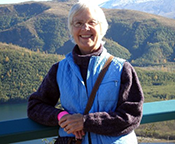I was watching the news covering the memorial services honoring those who died during the terrorist attacks nine years earlier. As I listened to the poetry readings—which were a part of many of these services—I was reminded of the power of poetry for touching our souls. I also reflected on the absence of poetry in my own life and in the work that I do.
I work as a freelance writer and have been doing so for almost twenty years. In addition to many articles, I also have several published books. Most of my writing is in the form of educational materials and articles focusing on the professional development of educators. While I enjoy this work, after reflecting on the beauty and power of poetry, I decided that I wanted to expand and enhance my writing—and my life—by including more poetry in what I write and in how I live. To make this happen, I decided to read and write poetry every day for 100 days. My goal wasn’t to become a published poet. What I wanted was to see the world through a poet’s eyes and feel the magical dimensions of everyday life which often exist below the surface of immediate perception. I was also hoping to infuse some of this magic into my writing.
In addition to reading and writing poetry, I also kept a journal during my 100 Days of Poetry as a way of capturing what I might discover along the way. Following are several excerpts from my journal.
Day 5—Sept. 15, 2010
I find that poetry has a way of slowing me down. You can’t speed read your way through poetry; nor can you write poetry without pausing and reflecting. Writing a poem isn’t something you do and cross off your list. It’s something you do all day—as you eat cereal for breakfast and reflect on the beauty of the grain in the field ready to be harvested. Writing a poem is what you do when you open the blinds and say “Welcome world! Let’s spend the day dancing.” It’s what you do when you embrace a loved one and—just through a touch—tell him he’s the most important person in the world to you.
So writing poetry is really a way of living—not just one of the things you do as you make your way through life.
Day 11—Sept. 21, 2010
I sometimes look to poetry for answers to life’s mysteries, thinking that poets are in touch with a reality deeper than what I ordinarily perceive. Then I find in Mary Oliver’s poems more questions than answers—challenging questions about who I am, what I notice, what astonishes me, what I admire. Perhaps the answer to living deeply, to being aware of life’s mysteries is to live with more questions than answers.
In some ways, my life is like a poem. It carries and creates a story. At times, I read and savor poems already written; other times, I write my own. The poems I write might not be great literature, but they are my own—not only reflecting my thoughts and feelings, but also awakening new insights within me.\
Day 36—Oct. 16, 2010
Life comes with surprises—both good and bad. My hope is that I can embrace them all with equanimity. I find it helps to use poetry to express my thoughts and feelings and to come to terms with whatever comes my way.
Day 39—Oct. 19, 2010
To write a poem, we use words. To be a poet, I think, allows us to hear poetry even when there are no words. Poetry can be a part of stillness, of breezes, of flowing water; poetry can also be shining in a star and floating in a cloud. I sometimes hear poetry in music and feel it in a warm caress. I know there are times when poetry wells up in my heart, even though I have no words to express it.
Day 100—Dec. 19, 2010
I’ve often felt a strong connection between truth and beauty. Beauty comes in many forms; so does truth—especially the kind of truth that runs deep; the truth about things that really matter in life. I find that poetry often helps me get in touch with this truth.
How shall I write my poem for today—day 100? So much has occurred over the last 100 days—life is now different from what it was on Sept. 11 when I started my “100 Days of Poetry.” This seems symbolic. Some say the world changed after the Sept. 11th tragedy and that it would never go back to the way it was. I’m sure this is true. One of the ways I see it has changed is in the need to rely more on each other for safety, for reassurance that we can go on in spite of horrific events.
But today, I don’t want to write about tragedies. I want to reflect on truth, beauty, and simple pleasures. I want to reflect on how to make these a more prominent—and permanent—part of my life. It’s interesting how my “100th day” has taken me up to the solstice and almost to the beginning of a new year. These events invite reflections and decisions—about setting out a new path—in my life. I hope to remember this as I go forward.
Four years later…
It’s now been about four years since I completed my 100 Days of Poetry. The impact of that practice remains with me. Poetry has become a treasured part of my life. In addition to reading and writing poetry on a frequent basis, I also experience life in a more reflective way. My writing life, too, has taken on new dimensions. I’ve become more philosophical and write for a broader audience. Prior to my 100 Days of Poetry, most of my articles were academic and addressed such topics as children with disabilities, the development of language and literacy, and scientific thinking in young children. Since 2010, I’ve written articles on people’s connection with trees, the beauty of the bosque, and the benefits of poetry for young children. I love this new dimension to my writing.
If you’re looking for a way to enhance your writing in any genre, I strongly suggest the practice of 100 Days of Poetry. I have no doubt that adopting this practice—even once in your lifetime— can deepen your experience of being alive and add to the richness of your writing life.
About the author:
 Dr. Ruth Wilson works as an educational consultant and curriculum writer, with special expertise in the areas of early childhood environmental education and the development of language and literacy. Dr. Wilson’s career includes working as a classroom teacher in both regular and special education settings and as a teacher educator for over ten years at Bowling Green State University in Ohio.
Dr. Ruth Wilson works as an educational consultant and curriculum writer, with special expertise in the areas of early childhood environmental education and the development of language and literacy. Dr. Wilson’s career includes working as a classroom teacher in both regular and special education settings and as a teacher educator for over ten years at Bowling Green State University in Ohio.
Dr. Wilson’s published books include Nature and Young Children, Fostering a Sense of Wonder during the Early Childhood Years, and Special Educational Needs in the Early Years. Dr. Wilson’s articles have appeared in numerous publications including Environmental Education Research Journal, Green Teacher, Early Childhood News, Exchange, and American Forests. Dr. Wilson lives and works in Albuquerque, NM. She can be contacted at [email protected].
Also by Ruth Wilson:
1. Writing Poetry for Children (article)
2. Writing Your Ecological Autobiography (article)
3. Journaling in the Natural World (article)



